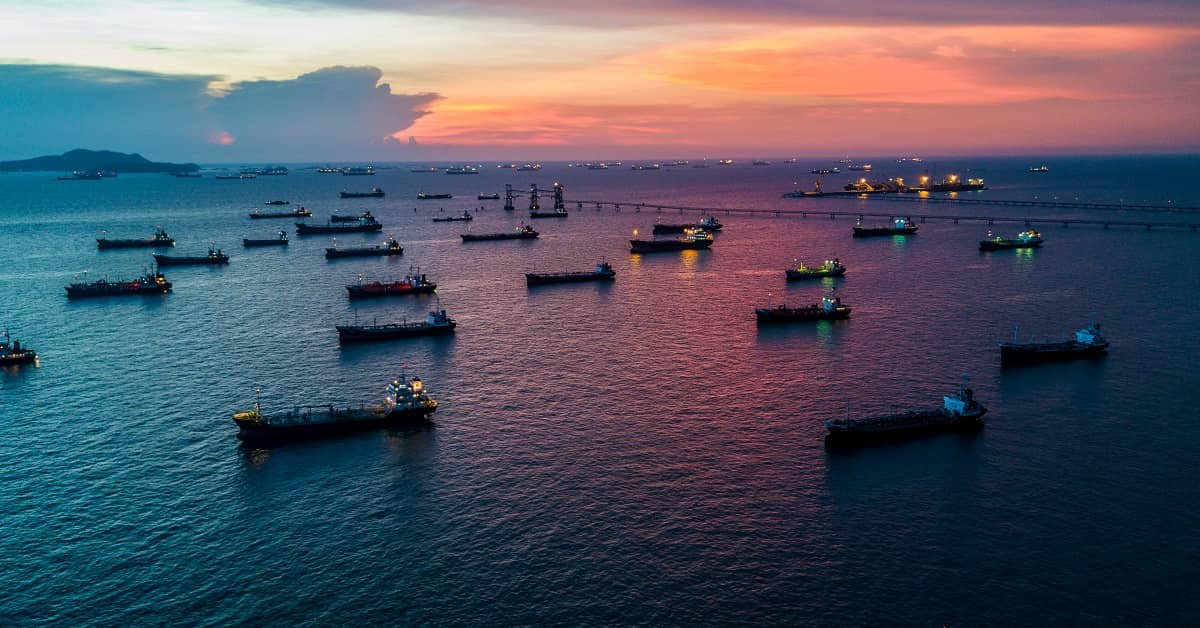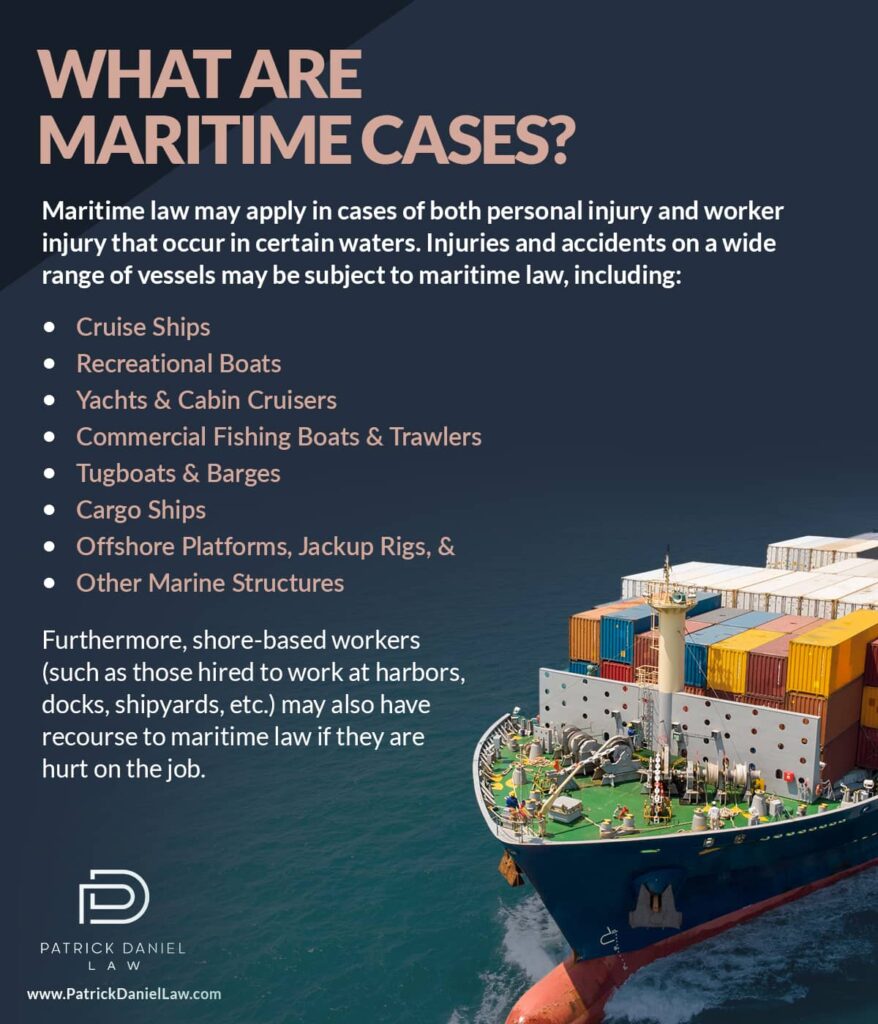
Maritime law is the general term for the code of law that governs the oceans and seas. Also known as admiralty law, maritime law governs a range of issues involving ships, offshore platforms, and more.
Whether you are a passenger on a ship or a worker on a vessel, it is in your best interest to hire a maritime law attorney if you are injured at sea. You may have multiple options for legal recourse.
At Patrick Daniel Law, our attorneys have extensive experience helping seamen and passengers alike navigate their rights under maritime law. Please contact our law firm in Houston today for a free case review.
Maritime law covers what are known as “navigable waters.” This includes bodies of open water – such as the Atlantic Ocean, the Gulf of Mexico, etc. – as well as “waters that … are presently used, or have been used in the past, or may be susceptible for use to transport interstate or foreign commerce” (according to Title 33 of the federal Code of Regulations, Navigation and Navigable Waters). In the latter case, certain lakes, rivers, and other bodies of water may also be subject to maritime law.
So, a boating accident may fall under the jurisdiction of Texas state law AND/OR federal maritime law depending on the body of water in which the accident takes place and the applicable state and federal laws.
Maritime law may apply in cases of both personal injury and worker injury that occur on certain waters. Injuries and accidents on a wide range of vessels may be subject to maritime law, including:
In addition to these and other vessels, offshore platforms, jackup rigs, and other marine structures are subject to maritime law as well. Furthermore, shore-based workers (such as those hired to work at harbors, docks, shipyards, etc.) may also have recourse to maritime law if they are hurt on the job.
Whether you hit the water for a day or you were on a cruise that lasted weeks or even months, you have rights if you suffer harm as a passenger on a ship. Maritime law may apply in cases such as:
Passengers may also have a maritime law case if they are injured in the course of boarding or disembarking a ship, as well as during excursions to the shore. If any of these scenarios apply to you, it is important to contact a maritime law attorney as soon as possible.

Most workers can file a workers’ compensation claim if they get injured on the job. However, similar claims from maritime workers are subject to different rules.
Under the Jones Act (a section of the U.S. Merchant Marine Act, which was originally enacted in 1920), employers are required to exercise reasonable care in the safety and upkeep of the vessel (a condition known as “seaworthiness”). If an employer is negligent in this duty, qualified workers (known broadly as seamen) can file a lawsuit to recover damages.
A seaman is, according to Title 46 of the U.S. Code concerning Merchant Seamen Protection and Relief, “an individual (except scientific personnel, a sailing school instructor, or a sailing school student) engaged or employed in any capacity on board a vessel.” Therefore, most employees who work at sea and on other navigable waters are covered by the Jones Act.
Specifically, the Jones Act makes provision for the “maintenance and cure” of injured maritime workers. At minimum, negligent employers are required to pay the living expenses (maintenance) and medical expenses (cure) incurred by an injured seaman. However, additional compensation may be recoverable in a maritime injury lawsuit for damages such as loss of earning capacity, pain and suffering, and more.
Workers who do not qualify as seamen may seek compensation for their injuries under the Longshore and Harbor Workers’ Compensation Act. This act covers disability and death resulting “from an injury occurring upon the navigable waters of the United States (including any adjoining pier, wharf, dry dock, terminal, building way, marine railway, or other adjoining area customarily used by an employer in loading, unloading, repairing, dismantling, or building a vessel).”
Under the act, injured longshore and harbor workers can be compensated for all medical expenses. In the event of disability, they may also be entitled to two-thirds of their weekly wages. Surviving family members of a longshore or harbor worker who is killed on the job may be entitled to a death benefit comprising reasonable funeral expenses (up to $3,000) and a percentage of the deceased worker’s wages.
Maritime law is complex, encompassing multiple rules, statutes, and agreements between the United States and other countries. Some maritime cases may be tried in a state court, while others may fall under the jurisdiction of a federal court.
Given these complexities, it is important to hire a maritime law attorney who can help you navigate your injury or accident case. Patrick Daniel Law has extensive experience handling maritime injury cases on behalf of clients in Texas, Louisiana, and other areas of the country.
Please call (713) 999-6666 today for a free case review. Our maritime law attorneys are based in Houston and serve clients nationwide.
 Top Truck Accident Lawyer in Pasadena
Top Truck Accident Lawyer in Pasadena Best of The Best Attorneys
Best of The Best Attorneys Best of the Best Houston Chronicle 2021
Best of the Best Houston Chronicle 2021 Best Motorcycle Accident Lawyers in Houston 2021
Best Motorcycle Accident Lawyers in Houston 2021 American Association for Justice Member
American Association for Justice Member The National Trial Lawyers 2016 – (Top 40 under 40)
The National Trial Lawyers 2016 – (Top 40 under 40) Multi-Million Dollar Advocates Forum 2016 (Top Trial Lawyer)
Multi-Million Dollar Advocates Forum 2016 (Top Trial Lawyer) Million Dollar Advocates Forum 2019 (Top Trial Lawyer)
Million Dollar Advocates Forum 2019 (Top Trial Lawyer) America’s Top 100 Attorneys 2020 (High Stake Litigators)
America’s Top 100 Attorneys 2020 (High Stake Litigators) Lawyers of Distinction 2019, 2020 (Recognizing Excellence in Personal Injury)
Lawyers of Distinction 2019, 2020 (Recognizing Excellence in Personal Injury) American Institute of Personal Injury Attorneys 2020 (Top 10 Best Attorneys – Client Satisfaction)
American Institute of Personal Injury Attorneys 2020 (Top 10 Best Attorneys – Client Satisfaction) American Institute of Legal Advocates 2020 (Membership)
American Institute of Legal Advocates 2020 (Membership) Association of American Trial Lawyers 2018 - Top 100 Award recognizing excellence in personal injury law
Association of American Trial Lawyers 2018 - Top 100 Award recognizing excellence in personal injury law American Institute of Legal Professionals 2020 (Lawyer of the Year)
American Institute of Legal Professionals 2020 (Lawyer of the Year) Lead Counsel Verified Personal Injury 2020
Lead Counsel Verified Personal Injury 2020 The Houston Business Journal 2021
The Houston Business Journal 2021